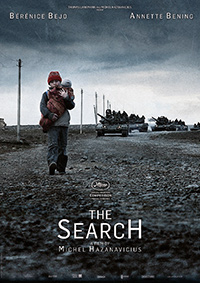Good Intentions Cobbled: Hazanavicius Chokes on War Story Update
 It’s clear to see that there were good intentions behind the making of Michael Hazanavicius latest film, The Search, a follow-up to his 2011 Best Picture winner, The Artist. Heretofore a director of silly or lighter themed fare, many of which showcase actress and wife Berenice Bejo, he dives headfirst into roiling dramatic waters with this update of Fred Zinneman’s 1948 film, headlining Montgomery Clift in his first theatrically released role (which snagged the actor an Oscar nod, as well as a win for its screenwriters and a special Oscar for child actor Ivan Jandl). Whereas the original dealt with a lost boy in an internment camp searching for his mother shortly after the end of World War II, aided by a friendly American G.I., Hazanavicius updates the tale to the 1999 Russian invasion of Chechnya, tacking on an additional perspective to create a triptych of diverging storylines. While there’s a chilling timeliness to this modernized examination considering recent actions the Russian government has taken, what results is an unmanageable tangle of competing narrative strands.
It’s clear to see that there were good intentions behind the making of Michael Hazanavicius latest film, The Search, a follow-up to his 2011 Best Picture winner, The Artist. Heretofore a director of silly or lighter themed fare, many of which showcase actress and wife Berenice Bejo, he dives headfirst into roiling dramatic waters with this update of Fred Zinneman’s 1948 film, headlining Montgomery Clift in his first theatrically released role (which snagged the actor an Oscar nod, as well as a win for its screenwriters and a special Oscar for child actor Ivan Jandl). Whereas the original dealt with a lost boy in an internment camp searching for his mother shortly after the end of World War II, aided by a friendly American G.I., Hazanavicius updates the tale to the 1999 Russian invasion of Chechnya, tacking on an additional perspective to create a triptych of diverging storylines. While there’s a chilling timeliness to this modernized examination considering recent actions the Russian government has taken, what results is an unmanageable tangle of competing narrative strands.
Opening in October of 1999, a Russian soldier films the brutal murder of a Chechnian husband and wife, their adult daughter screaming at the foot of their corpses. Several yards away, their young son witnesses the brutality as he clutches his baby brother. We switch to young Hadji’s (Abdul-Khalim Marmatsuiev) perspective as he abandons his baby brother with a Chechen family and strikes off on his own. Caught up in a detention camp, the now mute child is interviewed by Helen (Annette Bening), an overworked woman representing the Red Cross. He runs away into the streets, where he happens to meet a Frenchwoman named Carole (Berenice Bejo), a representative of the EU human rights commission, there to gather intel for a report meant to motivate the U.N. into action. She takes the lost boy into her apartment, though she clearly cannot communicate with him. Hadji’s older sister Raissa (Zukhra Duishvili) makes it her goal to find both brothers she became separated from when their parents were executed. On the opposite side of the conflict, we are invited to witness the dehumanization of a young Russian man, Kolia (Maksim Emelyanov), roped into military service, where he is systematically worn down into a brutal, uncaring killer.
Veering inconsistently between overdoses of cruel atrocities within the Russian ranks and the fruitless struggle to be heard by the unconcerned U.N., the film audaciously maintains the sentimental hopefulness evidenced in the original film. But whereas the 1948 title was dealing with picking up the pieces, this depiction settles us right into an ongoing conflict birthing fresh new ravages and tragedies on the daily. The addition of Kolia’s plight on the Russian front is so wickedly excruciating with its over-the-top homophobic flourishes that it borders on being insanely laughable. Likewise, the continual oscillation between this and the less dramatic threads completely unbalances the film’s rhythm.
Meant to depict the warping of innocence and how dehumanization results in atrocities of war, you’ll be able to see how Kolia’s plight ties into the tale at hand from a mile off. Come and See this is certainly not. While Raissa’s portion of the film is relegated to the seeming impossibility of searching for her lost siblings through lands still being ravaged, the film’s showiest segment, which showcases Bejo and Annette Bening, is the clunkiest. Bejo appears to be doing her best with the limiting material, but her performance comes across as grating, forced, and unconvincing. She incessantly speaks in French to the young boy with large, complicated sentences, which we’re eventually led to believe he kind of gets the gist of. But it’s a shockingly stilted performance from Bening that is the real disappointment in a handful of scenes that find the actress seeming bored and disinterested.
An attempt to show multiple perspectives of the horrors of war, The Search is an ungainly dose of good intentions that undercooks and over bakes. We’re conditioned to commit our focus to what appears to be the central narrative, that of Bejo struggling to make her voice heard as she helps a young boy in need. Yet, it’s the immediacy of Emelyanov’s unfortunate young soldier that steals our attention, even as he mutates inevitably. Unsure of itself in almost every regard, The Search, which ends nearly exactly as the film it’s based on does, there is little it seems to say beyond the fact that war is an atrocious phenomenon of mankind. A more concise film with stronger convictions, thought provoking writing and committed performances perhaps could have made this material more worthy of a running time of two and a half hours.
Reviewed on May 21 at the 2014 Cannes Film Festival – Main Competition – 000 Minutes
★★½/☆☆☆☆☆


